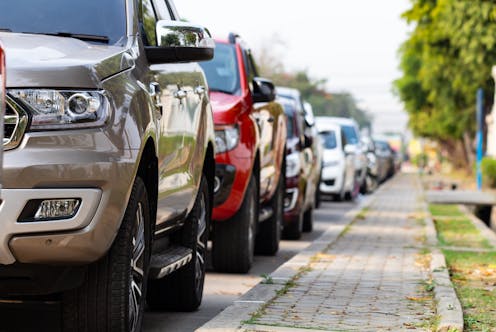We’re seeing more big cars on our roads, especially large wagon-style vehicles with a four- or all-wheel drive, known as sport utility vehicles or SUVs. For every passenger car sold in Australia, almost three SUVs are sold . Vehicles such as pickup trucks, large utes, minivans and SUVs tend to offer more protection to their occupants than smaller cars.
This is largely due to their larger mass and the way their structures are designed to absorb impact. For the drivers and passengers, this can mean a lower risk of injury in multi-vehicle collisions. But those same attributes increase the risks to occupants of smaller vehicles, pedestrians and cyclists.

The height of the large vehicle’s front end can intrude into the passenger compartment of a smaller vehicle and its greater mass can lead to more forceful impacts. Surveys show drivers believe larger vehicles are safer. This has a major influence on deciding which car to buy (among other factors such as prestige and off-road capabilities).
The perception of safety could potentially lower a driver’s sense of risk aversion, leading to riskier driving behaviours, such as adopting less cautious hand positions on the steering wheel. SUV drivers more frequently drive with one hand (as opposed to a “10-2 o’clock” hand position), suggesting they feel safer than other car drivers. A study from the Netherlands found a significant increase in fatality risk with heavier vehicles.
This has also been seen in the United States, wher.























